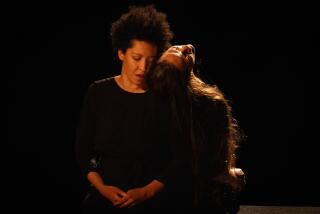Camille has one thread and plenty of hooks
A lot of references come to mind while hearing “Le Fil” (Narada), the extraordinary album by French singer-composer Camille (she uses only her first name). It was released a year ago on Virgin France (and awarded a pair of Victoires -- the French equivalent of the Grammy Award) and now is being released -- after far too long a delay -- in this country.
Camille put out her first CD, “Le Sac des Filles,” in 2002; she also was featured prominently in a few tunes on Nouvelle Vague’s 2004 album with bossa nova versions of new wave songs. Neither fully anticipated the music on “Le Fil.”
The CD, with Camille’s lush, multitracked vocals and ambient instrumental sounds, is structured around “Le Fil” (The Thread), a vocal drone note (on B natural) that begins and ends nearly every track on the album. The exception is the final song, “Quand Je Marche” (When I Walk), which is supplemented with an extension of the drone note lasting more than a half-hour (presumably as a pensive closer) and concluding with a brief flurry of emotionally laden words from Camille.
There’s not a single track that doesn’t appeal either for its sheer creative audacity or the attractive hooks of her melodies. “Ta Douleur” (Your Pain), for example, swings with a rocking, hand-clapping beat, grunting and hacking vocalized sounds and an instantly captivating chorus before it simply drifts back into “Le Fil.”
“Pale Septembre” is reminiscent in some respects of the Beatles’ “A Day in the Life” in its juxtaposition of contrasting elements and sudden dramatic twists. At one point, English lyrics sift through the French, with Camille singing, “I’ll never go to the sun / I’ll never, ever know if he is still alive / I’ll never reach the sun....”
The child-like “Vous” comes alive with richly rhythmic, a cappella vocal overdubs. And “Au Port” (“To the Port”) positions Camille’s voice (which reaches operatic proportions by the end of the song) in front of layered textures of vocal and instrumental sounds featuring trombone and synth.
Although an understanding of the French lyrics would obviously enhance enjoyment of the songs, this music transcends language, its appeal driven by the adventurous imagination of a stunning new international talent.
*
(BEGIN TEXT OF INFOBOX)
Across the musical borders
Camille is one of a growing number of female vocal artists from various parts of the world who are creating music that begins with traditional sounds and expands into a cross-boundary global view. Here are some of the more intriguing new releases.
Natacha Atlas
“Mish Maoul”
(Mantra/Beggars Group)
BELGIAN-born, with North African roots, Atlas uses her traditional background as the foundation for this album, singing with the passionate intensity that has made her a star of Middle Eastern music. But she doesn’t hesitate to juxtapose tradition against rap vocals and hip-hop rhythms. “Feen,” for example, contrasts the darting string sounds of the Golden Sound Studio Orchestra of Cairo with a spirited rap opening. “Ghanwa Bossanova” and “Bab el Janna” switch gears, with her melismatic vocal roving above a floating bossa nova rhythm. Always charismatic, Atlas is as alluring as she is musically compelling.
*
Cibelle
“The Shine of Dried Electric Leaves”
(Six Degrees/Crammed Disc)
WITH the first tune -- Tom Waits’ atmospheric “Green Grass” -- Cibelle (another performer who prefers a single name) recalls Astrud Gilberto, especially in the youthful fragility of her voice. But it’s an impression that fades quickly as the Brazilian’s second album progresses into moods both brighter and darker. Lighthearted urban bossa novas such as Caetano Veloso’s “London, London” (sung with Devendra Banhart) mix smoothly with the more traditionally rooted “Arrete La, Menina” (sung with Seu Jorge) and a warm rendering of Antonio Carlos Jobim’s classic “Por Toda a Minha Vida.” Add to that the sampled background textures of “Mad Man Song” and the electronica of “Flying High,” all of it serving as launch pads for the in-your-ear intimacy of Cibelle’s vocals.
*
Yungchen Lhamo
“Ama” (Real World)
LHAMO’S third album solidifies her role as the “voice of Tibet” -- a voice with an almost irresistibly calming sound and texture. She explores much more than tranquillity on this album, however, with performances that also reflect the rough-hewn mountain grandeur of her native country, as well as a gripping duet with Annie Lennox on “Fade Away.” The most remarkable track may be “9/11,” a stirring, deeply felt response to the attacks of Sept. 11, 2001, recorded spontaneously in a New York studio.
*
Sara Tavares
“Balance” (Times Square Records)
TAVARES’ voice is filled with sunshine and light, and the daughter of parents from Cape Verde largely steers clear of the dark mornas favored by the likes of Cesaria Evora in favor of brighter, more optimistic songs. Among the highlights: “Bom Feeling” is a spirited track tinged with the sounds of street music; “Lisboa Kuya,” simmers with jazz-tinged harmonies and jaunty rhythms; “One Love” roves between African high life and Caribbean dance. Other tracks dip into funk rhythms and sprinkles of electronica, but Tavares’ singing seems closest to the spontaneity of jazz -- a direction that could make an appealing route for her next album. -- D.H.
More to Read
The biggest entertainment stories
Get our big stories about Hollywood, film, television, music, arts, culture and more right in your inbox as soon as they publish.
You may occasionally receive promotional content from the Los Angeles Times.










